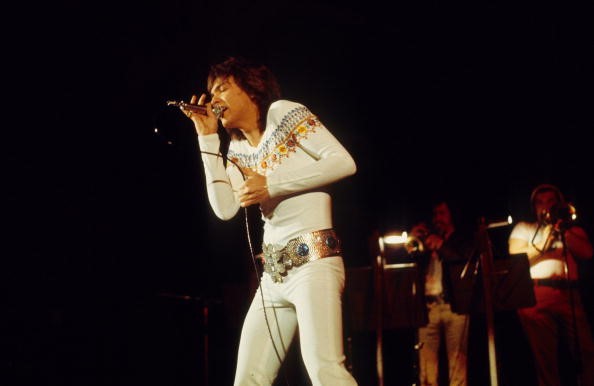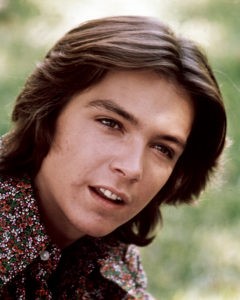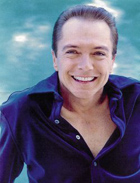
David Cassidy – April 12, 1950-November 21, 2017
November 21, 2017
By Dave Thompson
www.goldminemag.com

David Cassidy performs in Amsterdam, Netherlands. (Photo by Gijsbert Hanekroot/Redferns)
To the obituary writers, he was indeed David Cassidy, seventies teen-scream icon and not much thereafter.
To the early faithful, he was Keith Partridge, male lead in the only prime time post-Monkees sitcom to actually treat the music industry with the disrespect it deserves.
But to those in the know, he was the unwilling superstar who bestrode the first half of the 1970s like no other, whose face gazed down from countless teenaged walls; and whose music – both with and without the Partridge Family – forged an impermeable bond between lover and beloved.
It wasn’t easy being a David Cassidy fan back then, not if you were male, and probably not if you were much past pre-pubescence, either. People smirked. Sometimes they laughed. And often they looked a little uncomfortable. What other dark secrets, and nameless fascinations, were hidden behind that Black Sabbath T-shirt and the replica Jim Dandy washboard?
You don’t want to know, but hear me out anyway. For a start, he looked good… not in a “he’s so hunky, I could hug him” kind of fashion (although maybe he did, maybe you could), but in the way that a lot of rock stars ought to look. Not so well-coiffed that you knew it was a put-on; not so dirty scruffy that the fakery was thicker than the filth. He looked… real.
He had a voice that, under any other musical circumstances, would have been regarded among the greatest of the era – warm enough to convince, soft enough to seduce, but when he put his mind and muscle to it, strong enough to boogie with the best of them. Catch his “Please Please Me.” He knows what he’s singing about, even if the kiddies didn’t understand.

David Cassidy wearing a paisley shirt in a portrait issued as publicity for the US television series, ‘The Partridge Family’, USA. The sitcom starred Cassidy as ‘Keith Douglas Partridge’. (Photo by Silver Screen Collection/Getty Images)
And when Cassidy covered a song, it stayed covered, not like the scrappy tatty slop-bucket merchants that aspired (and still aspire) to his throne, who could no more get behind a song than they could fly. Or sing, for that matter.
His records still sound fabulous, too. “Cherish”, “Could It Be Forever”, any one of so many Partridge classics (“I Think I Love You” is one of the classic songs of the Age), “Daydreamer”… and what he did to the Beach Boys’ “Darlin’” eclipsed even their original.
Yes, he truly could have been a contender. Instead, he became an idol, and spent most of his four years at the top bucking hard against it. “CC Rider”, “Be Bop a Lula”, Delta Lady”, “For What It’s Worth”, “Massacre at Park Bench” – these were not the choices of the sallow pop puppet that trendy rock fans liked to make out he was. These were the sound of a genuine artist wrestling the prison bars open.
Shoehorned into the role that made him famous, and then nailed there by the pressures that surrounded him… dedicated to his audience, but impatient for them to grow out of their love for him… Cassidy fought the law in the only way he could, by fearlessly battling to educate the kids into the music that he enjoyed.
It’s no coincidence that the last couple of Partridge Family albums, the best of the entire batch, are the ones where he was actually allowed to choose the music; nor that his first post-weenyfodder album should be titled The Higher They Climb… the Harder They Fall, and open with a song called “When I’m a Rock’n’Roll Star”. Just as it’s no coincidence that, when his dream came true and the screamagers did shut up, his fame faded fast.
A decade-long retirement from live performance following the death of a fan at a 1974 London show was interrupted only by a string of increasingly overlooked albums. A studio liaison with Mick Ronson, fresh from his own years with Bowie, Mott and Dylan, has been airbrushed even from the guitarist’s list of accomplishments, although Ronson and Cassidy, on separate occasions, both mentioned that one of things that drew them together was a shared experience of the perils of hyperbole. Particularly when it’s applied to oneself.
Twenty when fame came knocking, twenty-five when he scored his last sizable hit, Cassidy was into his thirties when he returned to action, and already he was resigned to the nostalgia circuit. Occasionally he’d release a new record and build up his hopes that this time, things might be different, and whichever publicist was working the angles would cautiously warn inquiring journalists, “Whatever you do, don’t mention the Partridge Family.”
Only for Cassidy to do so, a few minutes in. No matter what his dreams might be, deep down he still knew what the fans wanted to hear, and the fact that they were now grown adults did not, it transpired, shatter the bonds that bound them all those years before.
To the end, Cassidy continued performing, continued entertaining, continued singing those wonderful songs. And the middle-aged women who used to be girls still screamed and professed their undying love; still hurled mementoes at the stage in the hope he’d throw them back, a drop of his sweat or a flake of his skin an eternal keepsake of the night they stood this close to ecstasy.
He still mattered, and that is why his death, aged just 67, hits as hard as any of the many fellow superstars who have fallen in recent years. Not because he was or wasn’t still popular; not because he was or wasn’t ever fashionable; not because he did or didn’t kick the ass of more-or-less every other rock performer of his generation.
It hits hard because, more than almost any of them, David Cassidy was so deeply embedded within our most tactile memories of the early 1970s that, without him, we may not have them, either.
“Could It Be Forever?” he sang in 1972. Sadly no, it couldn’t. But we should all wish it could have been.
